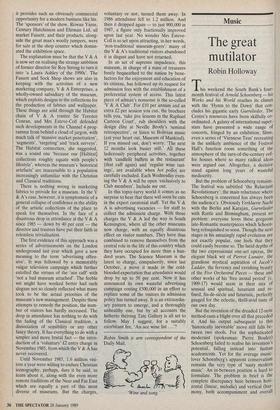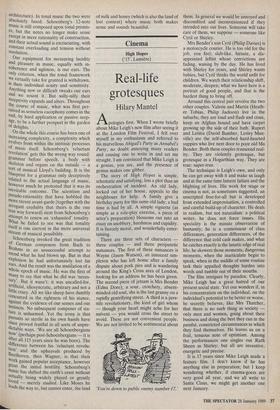Mu sic
The great mutilator
Robin Holloway
This weekend the South Bank's four- month festival of Arnold Schoenberg — his Works and his World reaches its climax with the 'Hymn to the Dawn' that con- cludes his gigantic early Gurrelieder. The Centre's resources have been skilfully co- ordinated. A galaxy of international super- stars have presented a wide range of concerts, fringed by an exhibition, films, even a series of `Viennese Teas' recreating in the unlikely ambience of the Festival Hall's function room something of the atmosphere of the turn-of-the-century cof- fee houses where so many radical ideas were argued out. Altogether, a decisive stand against long years of wasteful mediocrity.
But the problem of Schoenberg remains. The festival was subtitled 'the Reluctant Revolutionary'; the main reluctance where Schoenberg is concerned has always been the audience's. Obviously Verklaerte Nacht with the Berlin and Karajan, Gurrelieder with Rattle and Birmingham, present no problem: everyone loves these gorgeous late-Romantic masterpieces which Schoen- berg relinquished so soon. Though the next stages in his amazingly rapid evolution are not exactly popular, one feels that they could easily become so. The lurid depths of the two expressionist one-act operas, the elegant black wit of Pierrot Lunaire, the grandiose mystical aspiration of Jacob's Ladder, the fervency and ravishing beauty of the Five Orchestral Pieces — these and other works of his `free atonal period' (c. 1909-17) would seem in their mix of sensual and spiritual, luxuriant and re- fined, fin-de-siècle and futuristic, perfectly gauged for the eclectic, thrill-avid taste of our own day.
But the invention of the dreaded 12-note method casts a blight over all that preceded it. And his output subsequent to this 'historically inevitable' move still falls be- tween two stools. For the sophisticated modernist (spokesman: Pierre Boulez) Schoenberg failed to realise his invention's potential, falling instead into fustian academicism. Yet for the average music- lover Schoenberg's apparent conservatism remains the very type of 'nasty modern music'.- An in-between position is hard to formulate. The problem in brief is the complete discrepancy here between hori- zontal (linear, melodic) and vertical (har- mony, both accompaniment and overall architecture). In tonal music the two were absolutely fused. Schoenberg's 12-note music is still composed upon tonal premis- es, but the notes no longer make sense except in mere rationality of construction, and their actual sound is excruciating, with constant overloading and tension without resolution.
Our equipment for measuring lucidity and pleasure in music, equally with in- coherence and ugliness, is our ears. The only criterion, when the tonal framework we virtually take for granted is withdrawn, is their individual acuity and sensitivity. Anything new or difficult tweaks our ears and we resent it. But willy-nilly their receptivity expands and alters. Throughout the course of music, what was first per- ceived as senseless cacophony comes in the end, by hard application or passive seep- age, to be a further prospect in the garden of delights. On the whole this course has been one of increasing complexity, a complexity which evolves from within the intrinsic processes of music itself. Schoenberg's 'reluctant revolution' gets this the wrong way round: grammar before speech, a body with skeleton and organs on the outside — a sort of musical Lloyd's building. It is the blueprint for a grammar only deceptively related to the actual language of music, however much he protested that it was its inevitable outcome. The scientism and pseudo-rationality that have hobbled the more recent avant-garde (together with the arrogant credulity that theirs is the one true way forward) stem from Schoenberg's attempt to renew an 'exhausted' tonality. What he failed to see was that tonality itself is one current in the more universal stream of musical possibility. Schoenberg invoked the great tradition of German composers from Bach to Brahms in an unsuccessful attempt to mend what he had blown up. But in that explosion he had unfortunately lost his ears. And the result was the mutilation of a whole epoch of music. He was the first of many to say that what he did was 'neces- sary'. But it wasn't: it was uncalled-for, artificial, idiosyncratic, arbitrary and not a little crazy. All we like sheep have dumbly Concurred in the rightness of his stance, against the evidence of our senses and our instincts. No subsequent composer of sta- ture is unharmed. Yet the irony is that Pursuits so sterile in his own hands have since proved fruitful in all sorts of unpre- dictable ways. 'We are all Schoenbergians now' (perhaps post-Schoenbergians — it is after all 115 years since he was born). The difference between his 'reluctant revolu- tion, and the upheavals produced by Beethoven, then Wagner, is that their Work gained popular acceptance, however great the initial hostility. Schoenberg's music has shifted the earth's crust without actually being widely played or greatly loved — merely studied. Like Moses he leads the way to, but cannot enter, the land of milk and honey (which is also the land of lost content) where music both makes sense and sounds beautiful.


















































 Previous page
Previous page